No Matter of Insistence
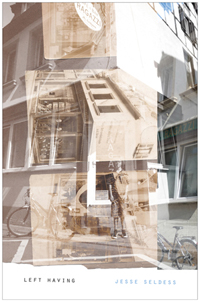 Left Having
Left Having
by Jesse Seldess
Kenning Editions, 2011
112 pages / $14.95 Buy from Kenning Editions or SPD Books
Jesse Seldess’s work asks for time. It doesn’t demand time, it just gently requests it. A space to sit with it, a time to read it aloud, to perform it yourself in your own voice and body.
In his two books—Who Opens and Left Having (both from Kenning Editions)—Seldess writes short echoing, transmogrifying lines, separated often by large spaces on the page. The poetry is formed out of these minimal bits and their steady repetition: lines that subtly alter as they repeat in various forms over the course of the pages.
If I let the ending continue
If I left impending continue
If I left the end to you
We can meet in this place
Previous to seeing his books, I’d heard Seldess reading his poetry in a recording on Pennsound. I was blown away by the slowness, the paused rhythm, the continual stops. It felt daring to stand up and read in this glacial way, and yet his voice was so unassuming about his slowness. At the end of one reading, he says, “Thanks for your patience.” It’s an endearing experimentalism, an quietly apologetic foray into a different kind of poem. I like the playful timidity of his work, his awareness of the space it takes up in the world. An antithesis of (and antidote to) avant-garde bravado.
In all of Seldess’s work is an attention to the spaces between: “Incompletely binding // Little things / With.” This hanging preposition signals the silence that often serves as a super-structure for his work. In his readings, Seldess carefully matches the length of his silences to the size of the spaces between lines and stanzas on the page.
This very concrete relationship between page and performance appears to be one of Seldess’s central concerns: from 2000 until 2012, Seldess published antennae, a journal of experimental writing and language-based music and performance scores. (Issues 1-7 are available as free pdf downloads. Issues 9-12 are available for purchase. Issue 8 seems to be in limbo.) When work is so intensely aural, the page begins to function as a score for performance.
In one of his readings on Pennsound, Seldess says of his first book, Who Opens: “all the pieces in the mansucript in some way are concerned with the issues and dynamics of formation, sort of an awe, wonder, and appreciation of it, and at the same time a fear and skepticism of it, ranging through that spectrum.” I felt this powerfully in both of the books: an attention to how words build or fail to build, to how the mind is able or unable to form something out of words.
Some of the poems in Seldess’s first book emerged out of his work in social services with the elderly, specifically with those affected by dementia and Alzheimers. This awareness of the mind and its failures is powerfully present: all the time thinking about contact: “To be close // Near that mouth / From here instance.”
January 21st, 2013 / 12:00 pm
An Interview with Tim Roberts, Co-Founder of Counterpath in Denver
I’ve been thinking a lot over the last year about how to nurture innovative writing communities and build structures to support those communities in places where they don’t exist, or where the existing structures are rickety or shoddy. About ways to create horizontal networks of writers interested in dialogue and exchange about art and writing outside of a university context. Maybe it’s because I’ve spent too many hours at readings with authors aiming for the NYC big leagues and elbowing each other for position. Too many evenings listening to the same “good story” or “good poem” lectures. Disappointed and often frustrated by the lack of innovative lit/art endeavors outside of a handful of big cities (and smaller centers), I’ve been looking for models for building innovative / small press / interdisciplinary writing communities in all the places we live.
As I set out to look for different examples, one kept coming up: Tim Roberts and Julie Carr’s work to build Counterpath in Denver, Colorado. Counterpath combines so many things: a press, a bookstore, a gallery, a performance space; their focus on the work of writers and artists who are driven to make “linguistic and visual interventions in contemporary global culture” seems spot-on. I am particularly drawn to Counterpath because their definition of what is “new” seems broad and because they are explicitly interested in work from groups often under-recognized in the experimental literary universe: people of color, women, queers. And their list of readings and events made me oh-so-excited: CA Conrad, Rodrigo Toscano, giovanni singleton, Lisa Robertson, Eleni Sikelianos. They’ve collaborated on events with Ugly Duckling Presse and Coffee House Press. I wondered how they did it all, how it all started and wanted to see if there was something I could learn from their experiences. Of course, being in the experimental hotbed of the Denver/Boulder area makes their job a bit easier, but I still wondered how they’d done it. There’s a great interview by Noah Eli Gordon with Julie Carr on the Volta that addresses some of these questions, but I still had more questions when I finished reading it.
So I sent Tim Roberts at Counterpath an email to see if he could give more details about the kind of work they’re doing. This interview is the result. Enjoy.
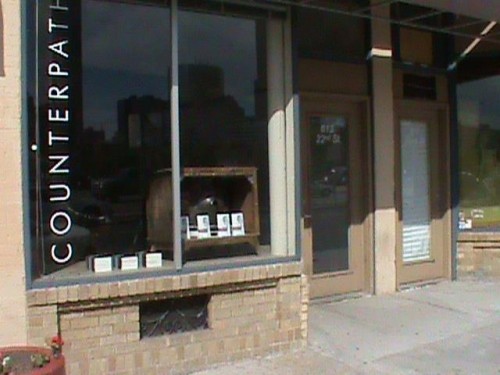 JP: How did you and Julie Carr begin Counterpath? Why and when? Was it originally a press or a space or a bookstore? Which came first? How did the other pieces develop over time?
JP: How did you and Julie Carr begin Counterpath? Why and when? Was it originally a press or a space or a bookstore? Which came first? How did the other pieces develop over time?
TR: We were living in Oakland, CA, when we started the press, in January of 2006. Julie was finishing a Ph.D. in English at UC Berkeley and I was working in book production at Stanford University Press. Both of us were doing a lot of writing, and then at that point I thought I could deal with most of what was necessary in terms of making the books, including design. The press project itself kind of just came to us and seemed like a natural progression of what we were already doing. We thought it might be useful in two distinct ways, in that it was a project grounded in a broad concept of writing itself, picking up from writers like Blanchot—not necessarily connected to a book, or ink on paper—and that responded to a sense of I guess political hopelessness when the US actually re-elected George W. Bush in 2004.
A Man Reads Men by the Lips of Women
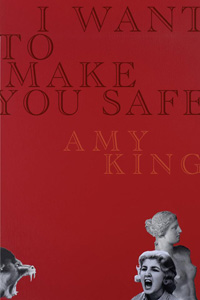 I Want to Make You Safe
I Want to Make You Safe
by Amy King
Litmus Press, 2011
87 pages / $15 Buy from SPD Books
Amy King is doing God’s work. Of course, I don’t mean God in a traditional Christian way; I mean God in the way that King speaks of God in her recent book, I Want to Make You Safe:
of our collective minds
of our collective wing wax
of our flights past time zones.
King’s poetry—its meandering syntaxis, its resistance to singular meanings, its mysterious connections and lack of connections—opens up the mind to unexplored avenues of thought. I also find King doing this work through her editing, specifically on the journal, Esque, which she co-edits with Ana Božičević, in which they bring together a wide array of contemporary poets and prose experimentalists, people like Jennifer Karmin, Cara Benson, Cynthia Arrieu King, Ching-In Chen and more. The new edition alone should get her a seat in heaven. If you haven’t seen the third issue, called Revolutionesque, you should definitely check it out.
February 24th, 2012 / 1:00 pm
It Takes Two, Baby
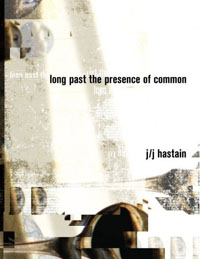 long past the presence of common
long past the presence of common
by j/j hastain
Say It With Stones, 2011
87 pages / $12 Buy from Say It With Stones
&
Dear Failures
by Trey Sager
Ugly Duckling Presse, 2011
28 pages / $10 Buy from UDP
This week I went to an art museum showing contemporary work by two gay male artists. The two exhibits were chosen to put the pair in conversation with each other: Donald Moffett, who worked with Act-Up in the eighties, and Glen Fogel, who was born in 1977. I wandered through the exhibits looking at the projected paintings, arms emerging from holes, wedding rings and re-painted love/hate letters. Afterwars, I walked outside into the cool autumn air and sat down in the sculpture garden next to the museum. I’d been trying to make time to read j/j hastain’s new book long past the presence of common, and I finally had made the perfect moment. The sun was setting through the trees, the air was warm enough.
October 28th, 2011 / 12:00 pm
There will be nothing left here but the sea
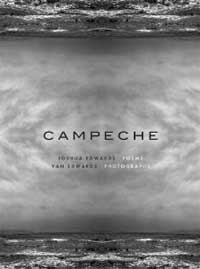 Campeche
Campeche
Poems by Joshua Edwards
Photographs by Van Edwards
Noemi Press, 2011
112 pages / $15 Buy from SPD
In the national artistic dialogue, there are usually but two coasts: East and West. The Gulf Coast barely enters the radar screen and, when it does, it’s normally because of a great tragedy like Katrina or the BP Horizon disaster. A chance for artists to express their solidarity or disgust or anger or sadness or pity.
September 9th, 2011 / 12:00 pm
Thinking Around gowanus atropolis by Julian Brolaski
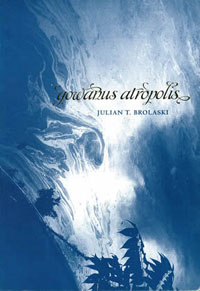 gowanus atropolis
gowanus atropolis
by Julian Brolaski
Ugly Duckling Presse, 2011
104 pages / $15.00 Buy from UDP
We no longer reveal totality within ourselves by lightning flashes. We approach it through the accumulation of sediments.
– Edouard Glissant
Every word in gowanus atropolis carries the traces of having been moved, altered, shifted. Even the undergirding of the lines and stanzas feels rearranged and restructured to create a different kind of progression, far from a logical exposition. Both syntax and spelling have been remade: “one ynvents a grammatical order / (& haf done).” We are in a specific post-industrial space, the New York City around the Gowanus Canal in Brooklyn, and we are listening to an elegy for the pastoral in a stridently non-pastoral setting, a polluted landscape struggling to survive. The experience of this landscape through words is only possible, Julian Brolaski seems to be saying, once everything has been pushed off its foundations a bit, with everything askance, a little slanted by the inclusion of a slew of portmanteaus, archaic words, macaronics, neologisms, transpronouns like xe, and of-the-moment slang. Suddenly even the most obvious and brutal contemporary slang seems bizarre and highlighted in the mass of new or n-used words. In the thicket of all these strange words, there are some we recognize, some which very few readers could ever possibly know and then others that no one has ever read on the page before. These (queer) words open up all sorts of possible readings, mis-readings and failed readings, and they also open up a space for play, for contradiction and confusion, for being lost.
August 5th, 2011 / 12:00 pm
